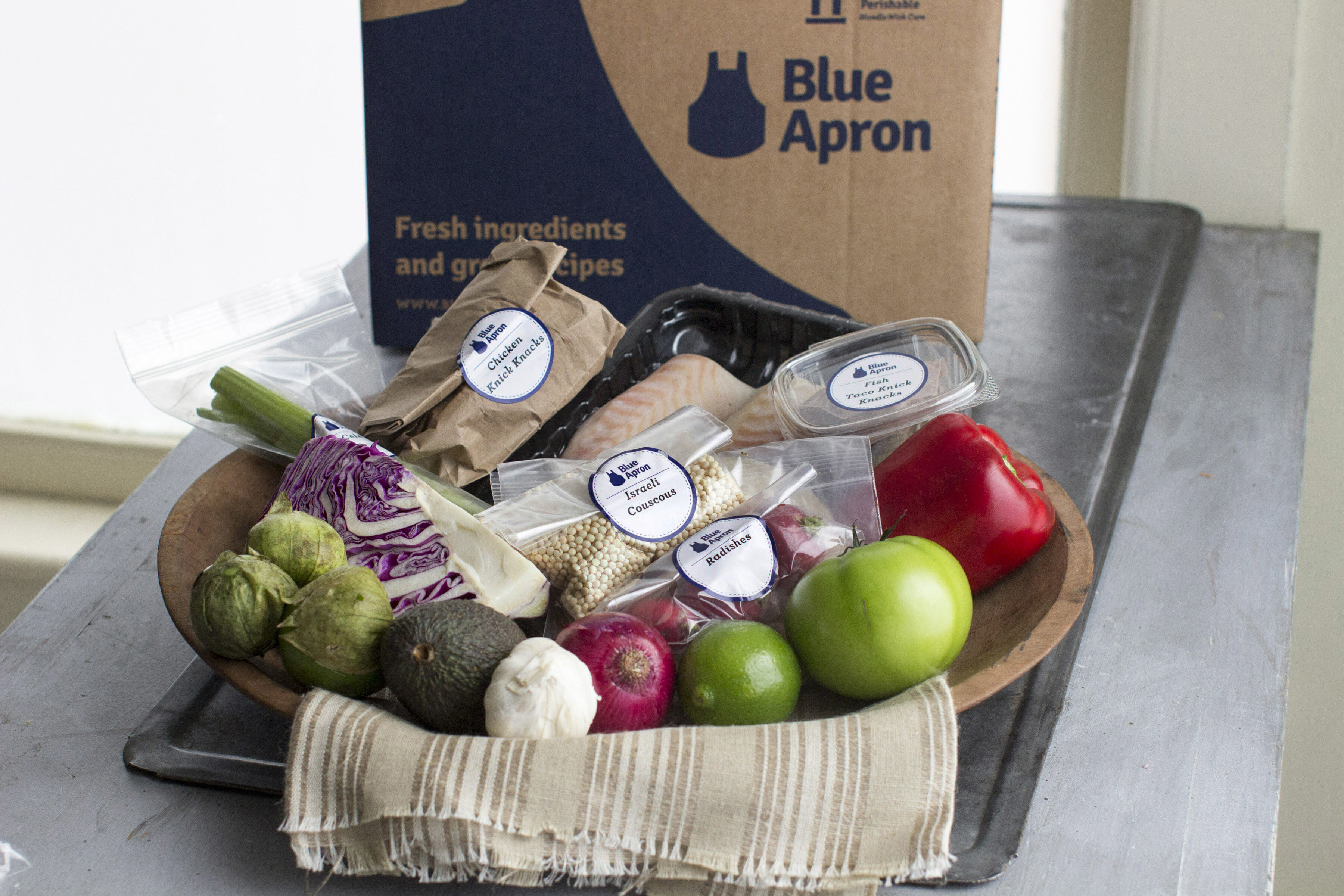
Blue Apron latest to suffer in tough meal kit market
Meal kit companies face an ultimatum: Adapt or die.
The business is still in its infancy, with the biggest players — Blue Apron and HelloFresh — less than a decade old. But they’re facing serious challenges from restaurant and grocery delivery services, smaller niche players and even home chefs.
The struggle intensified Monday, when Blue Apron announced that it could be delisted from the New York Stock Exchange because its closing share price has been lower than $1 since early May. The company’s share price closed down 8% Monday to 68 cents.
New York-based Blue Apron said it will try to raise its stock price with a reverse stock split, which will be subject to a vote of its shareholders at the company’s annual meeting on June 13.
Subscription-based meal kit companies face numerous problems. For one, they appeal to a small population. NPD Group, a consulting firm, estimates that just 4% of U.S. consumers have tried them.
It also costs a lot for companies to prepare, package and ship fresh ingredients, so meal prices are high. And once kits arrive, subscribers still have to put the ingredients together.
“Meal kits are a more expensive but less convenient option for busy people who do not have time to cook,” said Cara Brosius, a market research analyst with Packaged Facts.
Brosius said meal kit customers have also complained about limited menu selection, poor quality of ingredients and too much packaging.
Blue Apron hasn’t made a profit since its 2017 IPO. It’s been losing customers, who quickly tire of its relatively high prices — $9.99 per serving for a two-person plan — as well as its subscription plan, which forces them to be less spontaneous. Blue Apron’s customer base fell 25% to 557,000 between 2017 and 2018.
Others have struggled. Meal kit company Chef’d closed its doors last July. And some have been swallowed up. Albertons grocery chain, for instance, acquired the Plated brand in 2017 while Kroger acquired Home Chef last year.
Darren Seifer, a food industry analyst with the consulting firm NPD Group, said the meal kit market feels like the dot-com boom of the late 1990s.
“It’s a very crowded space, with a lot of companies not paying too much attention to the bottom line,” he said. He expects consolidation, which is already happening. HelloFresh bought organic meal kit provider Green Chef last year, for example.
Packages Facts says the U.S. meal kit market grew 22% to $3.1 billion in 2018, but it expects that growth to decelerate over the next five years because of competition. UberEats, for example, will deliver a restaurant meal for $3.99 plus a service fee. Chefs for Seniors promises a visit from an in-home chef, 12 meal servings and clean-up for $99 plus groceries.
Seifer said there is a place for subscription-based meal plans. They have a lot of appeal for people with specific dietary needs, he said.
But he thinks the most successful companies will also branch out into grocery stores or delivery, offering on-demand meal kits. Seifer’s research has shown that up to 60% of Americans don’t know what’s for dinner at 4:30 p.m. They want easy options they can pick up on their way home.
HelloFresh started selling meal kits at Stop & Shop and Giant grocery stores last year. Blue Apron has teamed up with Jet.com to offer same-day meal kit delivery in New York. It also had a six-month trial with Costco, but that ended last year. Amazon is selling meal kits at some Whole Foods and Amazon Go convenience stores.
In a report on the industry late last year, Packaged Facts suggested other opportunities for growth. Some companies are specializing in niche diets. Purple Carrot, for example, serves vegans and targets athletes through its partnership with Tom Brady. One Potato designs its meals for families with kid-size portions.
Meal kit companies could also focus on on-demand delivery instead of subscription services, and on special-occasion meals, like Thanksgiving or Valentine’s Day, when consumers are looking for help and inspiration.
The Western Journal has not reviewed this Associated Press story prior to publication. Therefore, it may contain editorial bias or may in some other way not meet our normal editorial standards. It is provided to our readers as a service from The Western Journal.
Truth and Accuracy
We are committed to truth and accuracy in all of our journalism. Read our editorial standards.
Advertise with The Western Journal and reach millions of highly engaged readers, while supporting our work. Advertise Today.












